How to restore tables deleted by navicat

If the mysql database data is damaged or lost for some reason, if there is a backup, we can restore the previously backed up database backup. If there is no backup, it may be more troublesome, and the cost of retrieving data is also very high. Let’s introduce how to restore database files for mysql database
Recommended tutorial:MySQL introductory video tutorial
1. Open the navicat tool, connect to the mysql database, and select a database (for demonstration purposes, we select a test database here). In the menu bar above, select Backup, then select a backup file in the backup list and click "Restore Backup"
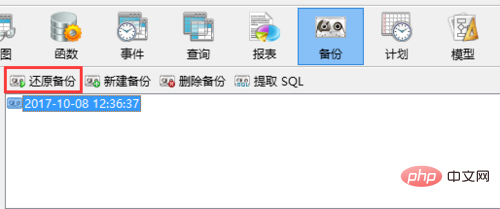
2. In the restore backup dialog box, by default General options are displayed, which displays detailed information about the backup file. Pay attention to checking the information and time point here, and restore to the wrong version
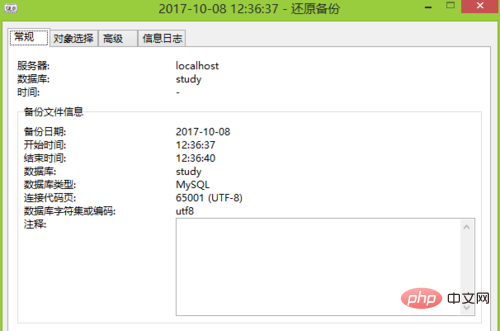
3. Switch to the "Select Object" option and check the data objects that need to be restored. By default, all Check it and restore it in full
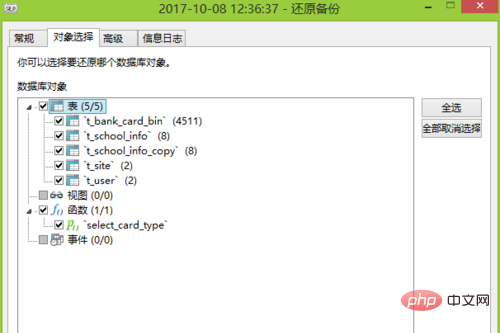
4. Switch to the "Advanced" option. You can check the corresponding options for server options and object options. If you don't want to overwrite the existing For some functions, just remove the corresponding check box
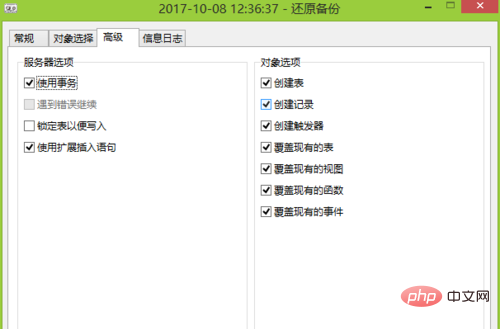
5. After the configuration check is completed, the information confirmation is completed. You can click the "Start" button to restore the backup. There will be a confirmation dialog box here, click to confirm development recovery. After the recovery is completed, "[Msg] Finished - Successfully" will be prompted in the log message, indicating that the recovery is complete.

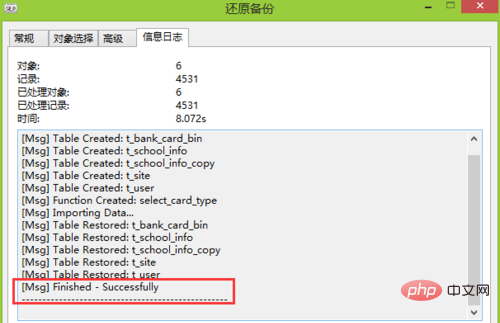
#6. For backup files, in addition to choosing to restore the backup, you can also choose "Extract SQL". This function can be obtained from Extract the sql statement from the previous backup file, and then select the corresponding data from the sql statement for incremental recovery or for data comparison.
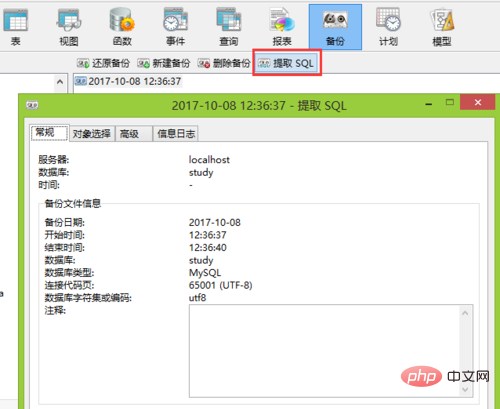
The above is the detailed content of How to restore tables deleted by navicat. For more information, please follow other related articles on the PHP Chinese website!

Hot AI Tools

Undresser.AI Undress
AI-powered app for creating realistic nude photos

AI Clothes Remover
Online AI tool for removing clothes from photos.

Undress AI Tool
Undress images for free

Clothoff.io
AI clothes remover

Video Face Swap
Swap faces in any video effortlessly with our completely free AI face swap tool!

Hot Article

Hot Tools

Notepad++7.3.1
Easy-to-use and free code editor

SublimeText3 Chinese version
Chinese version, very easy to use

Zend Studio 13.0.1
Powerful PHP integrated development environment

Dreamweaver CS6
Visual web development tools

SublimeText3 Mac version
God-level code editing software (SublimeText3)

Hot Topics
 1657
1657
 14
14
 1415
1415
 52
52
 1309
1309
 25
25
 1257
1257
 29
29
 1230
1230
 24
24
 How to use navicat keygen patch
Apr 09, 2025 am 07:18 AM
How to use navicat keygen patch
Apr 09, 2025 am 07:18 AM
Navicat Keygen Patch is a key generator that activates Navicat Premium, allowing you to use the full functionality of the software without purchasing a license. How to use: 1) Download and install Keygen Patch; 2) Start Navicat Premium; 3) Generate the serial number and activation code; 4) Copy the key; 5) Activate Navicat Premium, and Navicat Premium can be activated.
 How to see if navicat is activated
Apr 09, 2025 am 07:30 AM
How to see if navicat is activated
Apr 09, 2025 am 07:30 AM
How to check if Navicat is activated: View the Registration Information section in the "About Navicat" of the Help menu: Activated: Show valid registration information (name, organization, expiration date) Not activated: Show "Not Registered" or "Register Information Not Available" Check the activation icon in the toolbar: The green icon indicates that the active observation trial period countdown: The trial version will show the countdown at startup, the activated version will not view feature limitations: The trial version may limit advanced features, and the activated version will unlock all functions
 How to import sql file into navicat
Apr 09, 2025 am 06:24 AM
How to import sql file into navicat
Apr 09, 2025 am 06:24 AM
How to import SQL files using Navicat? Open Navicat and connect to the database. Open the SQL Editor. Import SQL files. Set import options (optional). Perform import. Check the import results.
 How to export the results of a navicat query
Apr 09, 2025 am 06:21 AM
How to export the results of a navicat query
Apr 09, 2025 am 06:21 AM
Export query results with Navicat can be performed step by step: 1. Select the data to export 2. Select the export format: CSV, Excel, XML, or JSON 3. Configure the export options: Select columns, separators, and filters 4. Select the save location 5. Start exporting 6. Verify the results
 How to execute sql in navicat
Apr 08, 2025 pm 11:42 PM
How to execute sql in navicat
Apr 08, 2025 pm 11:42 PM
Steps to perform SQL in Navicat: Connect to the database. Create a SQL Editor window. Write SQL queries or scripts. Click the Run button to execute a query or script. View the results (if the query is executed).
 How to roll back navicat
Apr 09, 2025 am 06:15 AM
How to roll back navicat
Apr 09, 2025 am 06:15 AM
Navicat provides rollback functionality to undo database changes. The rollback steps are as follows: Connect the database to expand the database to be rolled back in the object browser. Right-click the table and select "Rolleepback" to select the rollback time point. Click "OK"
 How to create stored procedures with navicat
Apr 08, 2025 pm 11:36 PM
How to create stored procedures with navicat
Apr 08, 2025 pm 11:36 PM
You can use Navicat to create a stored procedure, the steps are as follows: Open the database object list and expand the "Procedures" node. Right-click the Procedures node and select Create Procedure. Enter the stored procedure name and body and set the parameters (if required). Select Compile in the File menu to compile the stored procedure. By executing a query or using "E in the "Procedures" list
 How to create a table in navicat
Apr 09, 2025 am 06:09 AM
How to create a table in navicat
Apr 09, 2025 am 06:09 AM
The steps to create a table in Navicat include: Open and connect to the database right-click the database name and create a new table to set the table properties (table name, storage engine, character set, sorting rules) Add fields (field name, data type, length, empty value, default value) Set the primary key (check the "Primary Key" check box) Set the foreign key (select the columns associated with the reference table and the foreign key) Save the table Click OK




